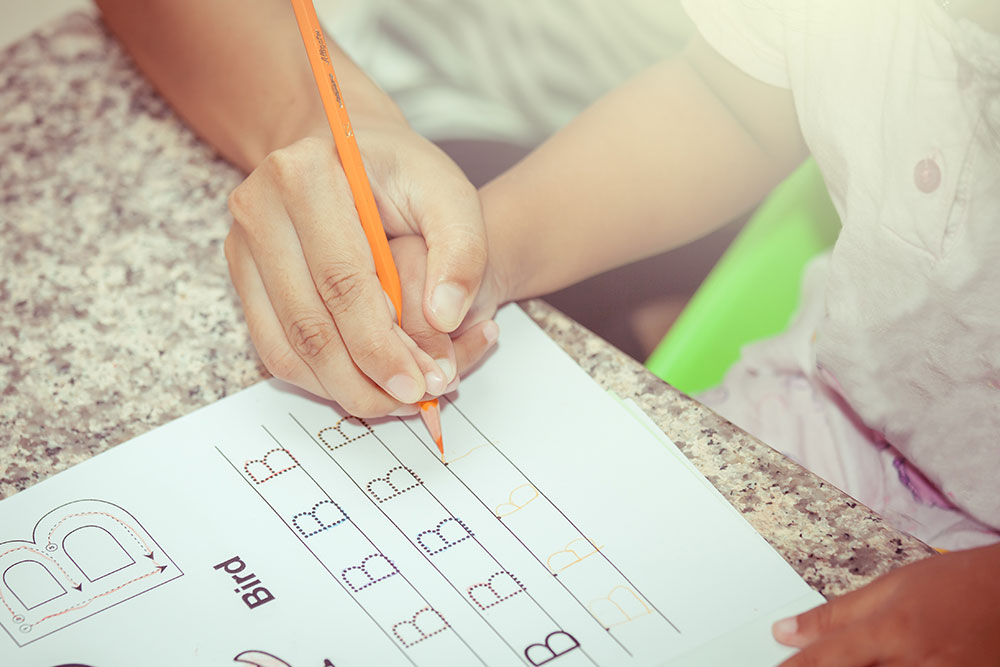
Not every student who struggles academically is lazy. In fact, many children and adolescents experience learning difficulties due to various disorders and health conditions. Instead of judging or discrediting their abilities, it's important to understand and identify these challenges so that appropriate support can be provided.
In this article you will learn:
- What is dyslexia
- What is dysorthography?
- What is dysgraphia?
- What is dyscalculia
- What is the impact of ADHD on learning?
- What impact does ADD - attention deficit disorder - have on learning?
- How does Asperger's Syndrome affect learning?
- How speech disorders affect learning
- What is the impact of hearing impairment on learning?
- What is the impact of visual impairment on learning?
- How does childhood depression affect learning?
- How to deal with a child's learning problems resulting from various disorders

Dyslexia - What is it?
One of the most common academic challenges is dyslexia, which is difficulty mastering basic academic skills like reading and writing. For many people with dyslexia, the reading and writing process is more complex than for others, requiring additional effort and time.
Dyslexia can be divided into 3 or 4 varieties:
-
Dysorthographia – Incorrect spelling despite knowing the rules.
-
Dysgraphia – Ugly, illegible handwriting.
-
Dyscalculia – Difficulty solving math problems
-
Dyslexia – understood in the narrow sense as difficulty in reading.
Symptoms of dyslexia:
-
Reading difficulties - People with dyslexia may have trouble recognizing letters, syllables, or words, leading to slow reading.
-
Word distortion - Children may read or write words in the wrong order or use neologisms.
-
Problems with spelling and grammar - When writing, they may make numerous spelling and grammar errors.
-
Delayed speech development - In younger children, this may manifest itself as difficulties in pronouncing certain words or sentences.
-
Poor articulation - Pronouncing certain sounds may be difficult.
-
Difficulties with constructing statements - People with dyslexia may have problems with creating complex sentences or statements.
Diagnosis and support for dyslexia
Dyslexia is often diagnosed at a young age, but it can also be diagnosed in adults. Diagnosis is based on reading and writing tests and observations by a specialist. People with dyslexia often benefit from individualized learning plans, additional support at school, and technology to support their learning. Early intervention and appropriate support are key to success. With the right help and tools, many people with dyslexia achieve academic and professional success.

Dysorthographia - what is it and how does it affect the student?
Dysorthographia is a specific difficulty mastering correct spelling. Individuals with dysorthographia may experience difficulty writing even though their reading and comprehension skills are adequate. Here's how dysorthographia impacts learning:
-
Spelling errors - People with dysorthographia may make spelling errors that are not due to a lack of knowledge of spelling rules, but to difficulty in applying them.
-
Difficulty taking notes - Writing problems can make it difficult to take notes during lessons, which can affect memory and learning.
-
Impact on self-esteem - Frequent spelling errors can affect a student's self-esteem, leading to reduced motivation to learn.
-
Difficulties in learning foreign languages - Dysorthographia can also affect the process of learning foreign languages, especially when it comes to spelling and grammar.
-
Impact on learning methods - People with dysorthographia may need an individual approach to learning and adapted educational methods that take into account their difficulties.
It's important to remember that individuals with dysorthographia have different abilities and strengths. Appropriate support and interventions can help them overcome their writing challenges and achieve academic success.

What is dysgraphia?
Dysgraphia is a specific writing disorder that is not the result of a lack of motivation, low intelligence, or lack of proper instruction. It affects a student's ability to write by hand and can impact learning in the following ways:
-
Writing Difficulties - Students with dysgraphia may have trouble forming letters, writing on lines, and maintaining an appropriate writing pace.
-
Fatigue - Writing can be physically demanding for people with dysgraphia. They may quickly experience hand fatigue while writing, which can impact the quality and quantity of their written work.
-
Organizational Issues - Students with dysgraphia may have trouble organizing their thoughts on paper, which can lead to difficulties structuring essays or written responses.
-
Low self-confidence - Because writing is a key skill in most school subjects, students with dysgraphia may feel less confident and avoid writing tasks.
-
Difficulties in other subjects - This disorder can affect more than just writing. For example, in math, students may have difficulty writing equations or creating graphs.
-
Inaccuracies and errors - Although students may understand the material, their written work may be full of errors, inconsistencies, or difficult for the teacher to read.
-
Emotional Problems - Consistent difficulties and frustrations with writing can lead to emotional problems such as anxiety or avoidance of schoolwork.
It's important to remember that with the right support and strategies, students with dysgraphia can achieve academic success. This can include therapy, adapted teaching methods, and the use of technology such as computers or tablets to assist with writing.

Dyscalculia - What is it?
Dyscalculia is a specific difficulty with acquiring mathematical skills that is not due to general intellectual problems or inadequate education. It is a neurological disorder that affects the ability to understand numbers and learn mathematics at various levels.
Symptoms of dyscalculia:
-
Difficulty counting - People with dyscalculia may have trouble with mundane tasks such as counting coins or understanding concepts such as "more" or "less."
-
Problems learning the multiplication table - For many people with dyscalculia, the multiplication table can be particularly problematic.
-
Disturbances in the concept of time - This may include difficulty determining how much time has passed between two events.
-
Difficulty comparing numbers - Determining which number is larger and which is smaller can be a challenge.
-
Trouble Solving Simple Math Problems - Operations like addition, subtraction, multiplication, and division can be difficult to understand and perform.
Diagnosis and support for dyscalculia
Diagnosis of dyscalculia is based on math tests and observations by a specialist. Although diagnosis can be made at any age, early recognition and intervention are crucial to a student's academic success. Support for individuals with dyscalculia can include individual therapy sessions, specialized curriculum, and the use of technological tools to aid in math learning. Understanding and accepting dyscalculia as a real disorder is crucial. With the right support and tools, many individuals with dyscalculia can achieve success in school and in their careers.

ADHD and learning
ADHD, or Attention Deficit Hyperactivity Disorder, is a disorder that can significantly impact the educational process of the affected individual. Although ADHD is often associated with excessive physical activity, it also encompasses aspects such as difficulty concentrating, impulsivity, and problems with the brain's executive functions.
The impact of ADHD on the learning process:
-
Concentration Problems - People with ADHD may have difficulty maintaining attention for long periods of time, making learning in a traditional classroom environment difficult.
-
Impulsivity - May lead to interruption of other students or the teacher, which disrupts the learning process.
-
Difficulty with organization - People with ADHD may have trouble planning and executing tasks, which can lead to them not completing homework or other school assignments in a timely manner.
-
Short-term memory impairment - May make it difficult to learn and remember new information.
-
Emotional problems - People with ADHD may be more sensitive to criticism, which can lead to problems with self-esteem and motivation to learn.
-
Need for movement - ADHD is often associated with an excessive need for movement, which can be problematic in a traditional classroom environment where students are expected to sit still for long periods of time.
-
Oppositional Defiant Disorder - A significant proportion of children with ADHD exhibit oppositional defiant disorder, which can lead to conflict with teachers and other students and a reluctance to perform school duties.
Tips and techniques to help you learn:
-
Regular breaks - People with ADHD can benefit from short, regular breaks while studying to satisfy their need for movement and refresh their attention.
-
Adapted teaching methods - An individual approach to the student, using more practical and interactive methods, can be more effective.
-
Technology support - There are apps and tools that help with organization, planning, and focus, specifically designed for people with ADHD.
-
Emotional support - Encouragement, positive reinforcement, and confidence building can help overcome the challenges of ADHD.
Collaboration with teachers, therapists, and families is crucial in providing appropriate support and an adapted learning environment for people with ADHD.

The impact of ADD on learning
ADD, also known as Attention Deficit Disorder, is a form of ADHD characterized by difficulty concentrating, without symptoms of hyperactivity. Individuals with ADD may experience difficulties in their academic pursuits due to these challenges.
The impact of ADD on the learning process:
-
Lack of focus - People with ADD can be easily distracted, making it difficult to focus on one task for an extended period of time.
-
Forgetting about assignments - They may forget about responsibilities, deadlines, or bringing needed materials to school.
-
Difficulty with organization - People with ADD often have trouble planning and organizing their time.
-
Impulsivity - Although people with ADD do not exhibit excessive motor activity, they can be impulsive in their decisions, which can affect their choices in the learning process.
-
Difficulty concentrating for long periods of time - Frequent switching from one topic to another or being easily distracted by external stimuli.
-
Emotional problems - People with ADD may be more sensitive and prone to frustration, which can affect their relationships with peers and teachers.
Ways to support learning:
-
Adapted teaching methods - Taking into account the individual needs of the student and adapting teaching methods and tools.
-
Regular breaks - Short study breaks can help you recover and increase your concentration.
-
Prioritizing - Helping you determine what is most important can help you organize your time better.
-
Emotional support - Encouragement and positive reinforcement can improve motivation to learn.
Although ADD can pose challenges in the educational process, with the right support and understanding, individuals with this disorder can achieve educational success.

Asperger's Syndrome and its impact on learning
Asperger's syndrome is a form of autism spectrum disorder that affects the communication and social skills of the individual affected. In the context of education and learning, Asperger's syndrome can pose certain challenges, but it can also be associated with unique abilities.
-
Social Difficulties - People with Asperger's Syndrome often struggle to understand social nuances, such as interpreting body language and tone of voice. This can lead to misunderstandings in the classroom.
-
Detail-oriented - People with this syndrome may have an intense interest in a narrow range of topics, which can lead to deep knowledge in certain areas, but also difficulty jumping between different topics.
-
Communication difficulties - Although many people with Asperger's syndrome have fluent speech, they may have trouble understanding jokes, sarcasm, or metaphors.
-
Sensory Disorders - Hypersensitivity to sensory stimuli such as bright lights or loud sounds can make it difficult to focus in a traditional classroom environment.
-
Routine - People with Asperger's syndrome often prefer routine and predictability, which means they may have difficulty adapting to changes in schedules or new situations at school.
-
Unique Abilities - Despite these challenges, many people with Asperger's syndrome have unique abilities, such as math, music, or art.
It is important for teachers and caregivers to be aware of the needs of students with Asperger syndrome, adapting teaching methods and the environment to provide the most favorable learning conditions for them.

Speech therapy disorders and their impact on learning
Speech-language disorders refer to difficulties with linguistic communication, including speech, language, and vocalizations. These can impact development and learning in various areas. Here's how speech-language disorders impact education:
-
Communication difficulties - Students with speech disorders may have trouble expressing their thoughts, feelings and needs, which can lead to frustration and misunderstandings with peers and teachers.
-
Reading and Writing Problems - Phonological and phonetic disorders can hinder decoding and encoding processes, which affects reading and writing abilities.
-
Reduced self-confidence - Students with speech difficulties may avoid participating in class discussions or presentations for fear of criticism or ridicule.
-
Difficulties with social relationships - Speech and language disorders can affect the ability to interpret nonverbal and verbal signals, which can lead to problems in establishing and maintaining relationships with peers.
-
Impact on hearing abilities - Some speech disorders can affect the ability to hear and understand speech, which can affect the ability to learn information in the classroom.
-
Need for individual support - Students with speech-language disorders often require individual support, such as speech therapy, which can impact their schedule and availability in the classroom.
It's important to remember that support and interventions are key to helping students with speech-language disorders achieve academic success. Early intervention and collaboration with speech-language pathologists and teachers can help overcome many of the challenges associated with these disorders.

The impact of hearing impairment on learning
Hearing disorders can have a significant impact on a child's development and education in many areas:
-
Difficulties with academic achievement - Children with hearing impairments may have difficulties in all areas of academic achievement, especially reading and math.
-
Communication problems - Hearing impairments can lead to difficulties in understanding and processing information, which affects a child's ability to communicate with peers and teachers.
-
Social Isolation - Communication difficulties often lead to social isolation and weaker interpersonal skills.
-
Behavioral Problems - Students with hearing impairments may experience frustration due to a lack of understanding, which can lead to behavioral problems in the school environment.
-
Language Development - Hearing impairments can affect a child's language development, which will affect the child's ability to express thoughts and feelings.
-
Impact on Communication and Behavioral Development - Communication and behavioral development are shaped by a child's ability to hear. If a hearing impairment goes undetected or is detected late (after age 6), these areas can be affected.
To minimize the impact of hearing impairment on education, early detection and intervention are important, as well as providing appropriate support in school.

The impact of visual impairment on learning
Vision impairments can have a significant impact on learning and education, affecting various aspects of a child's development. Here are some key areas where vision impairments can impact learning:
-
Reading and Writing Difficulties - Children with visual impairments may have difficulty recognizing letters, words, and understanding text. They may also have difficulty writing and copying notes from the board.
-
Coordination problems - Vision problems can affect a child's ability to coordinate movement, which can make it difficult to participate in physical education classes or other physical activities.
-
Social Isolation - Children with visual impairments may feel isolated from their peers because they may not be able to perceive subtle non-verbal cues or participate in certain games and activities.
-
Difficulty concentrating - If a child cannot see well, it may be harder for them to focus on tasks in class, leading to distraction.
-
Developmental Delays - Visual impairments can delay the development of a child's language and communication skills because many early learning experiences rely on visual stimuli.
-
Need for specialized tools and resources - Children with visual impairments may need specialized resources such as large print books, screen reader software, or other learning tools.
-
Low self-esteem - Persistent difficulties in learning due to vision problems can lead to low self-esteem and frustration.
It is important that schools and teachers are aware of the needs of students with visual impairments and provide appropriate support, tools and resources to help them achieve academic success.

The impact of childhood depression on learning
Childhood depression is a serious disorder that can impact many aspects of a young person's life, including their education. Here are some ways childhood depression can impact learning:
-
Reduced motivation to learn - Children with depression often have difficulty concentrating and staying motivated to learn, which can lead to a decline in academic achievement.
-
Memory and concentration problems - Depression can affect a child's ability to learn new information and also their ability to focus.
-
Social Isolation - Children with depression may feel isolated from their peers, which may affect their participation in group learning activities.
-
Increased school absenteeism - Children with depression may be more likely to miss school due to health problems or anxiety about attending classes.
-
Low self-esteem - Depression can lead to low self-esteem, which affects a child's attitude towards learning and educational pursuits.
-
Emotional difficulties - Children with depression may have difficulty coping with the pressures and stresses of studying, which can lead to them avoiding schoolwork and responsibilities.
-
Physical reactions - Depression can also manifest itself in the form of physical symptoms, such as fatigue or headaches, which make it difficult to concentrate on learning.
It is important for teachers and caregivers to be aware of the impact of childhood depression on the educational process and to provide appropriate support to students who need help coping with this disorder.

What steps should you take if you notice any of these symptoms?
If we notice symptoms suggesting a mental, learning, or behavioral disorder in a child or adolescent, it's important to take appropriate action to ensure they receive appropriate care and support. Here are some steps you can take:
-
Observation and documentation - Carefully observe your child's behavior and record any disturbing symptoms, their frequency, and the circumstances in which they appear.
-
Psychological and Pedagogical Counseling Center - The first step after noticing symptoms should be a consultation and assessment at a psychological and pedagogical counseling center. The specialists working at the center are trained to assess and identify potential disorders and offer appropriate support.
-
Further specialist testing - Depending on the results of the initial consultation, the clinic may refer the child for further specialist medical testing, such as neuropsychological, psychiatric or speech therapy.
-
Therapy and support - If a specific disorder is diagnosed, the clinic can recommend appropriate therapy or interventions, which may include individual or group therapy, remedial classes, or support at school.
-
Collaboration with the school - If necessary, contact teachers and school staff to discuss an educational support plan for your child that addresses their individual needs.
-
Family support - Families may need support in understanding the diagnosis and coping with the challenges the disorder can bring. Parent support groups, family therapy, or consultations with a psychologist can be helpful in this process.
-
Continuity of care - Monitor your child's progress regularly and maintain contact with professionals to adjust the support plan as needed.
-
Special assessment for children with Asperger's syndrome - In the case of disorders such as Asperger's syndrome, parents should obtain a special assessment of the need for special education, which will ensure that the child is properly cared for at school and that learning is adapted to his or her circumstances.


















Podziel się:
A simple Halloween decoration for a toddler - a pumpkin from a plate
Mindfulness Training for Children - Building a Healthy Mind from an Early Age